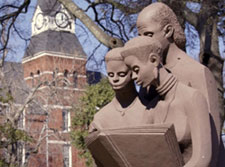
Tennessee State University intends to spend millions of dollars over the next five years to boost campus security with gated entrances and additional surveillance cameras to monitor more than 500 location points on campus, officials said.
The university's Blue Ribbon Commission on Campus Safety released a 100-plus page report yesterday during a press conference detailing security plans after the Halloween slaying of a man delivering food on campus last year.
"Tennessee State University is a safe campus," said Melvin Johnson, the school's president. "We saw the need for some improvements in safety. … We believe the work that the commission has pursued will be a gauge of where we are heading."
TSU has spent about $162,000 on more campus manpower since the shooting, officials said. That’s part of $2.1 million spent on campus security since 2001. The university has also been conducting safety measures such as random I.D. and vehicle checks on campus and has cameras already monitoring 128 location points.
"When we started (in 2001) it was to protect certain residence halls. Now, it has grown campuswide," said Samuel Polk, director of facilities management at TSU.
TSU's Blue Ribbon Commission was composed of representatives from Metro Police, the Tennessee Bureau of Investigation, TSU students and faculty and the community.
The recommendations would be implemented in several phases over the next few years. Some of the changes to come are:
• Security organization restructuring.
• Electronic proximity key cards for access to specific campus buildings for faculty and students.
• Additional surveillance cameras, security booths and emergency phones.
• A new surveillance system, along with staff to manage it.
• Relocation of campus security to a central location.
Officials hope the blue-ribbon commission's recommendations will serve as a model for other schools.
"I think we've put together a very comprehensive report that can be implemented," said Mark Gwyn, director of the TBI.
A Meharry Medical College official who worked on the commission said the medical school was considering adding surveillance cameras to monitor its campus as a result of the group's findings.
"The cost of safety, you really can't measure it," said Richard Briggance, chief of security at Meharry. "The commission has helped me and Meharry become safer."











